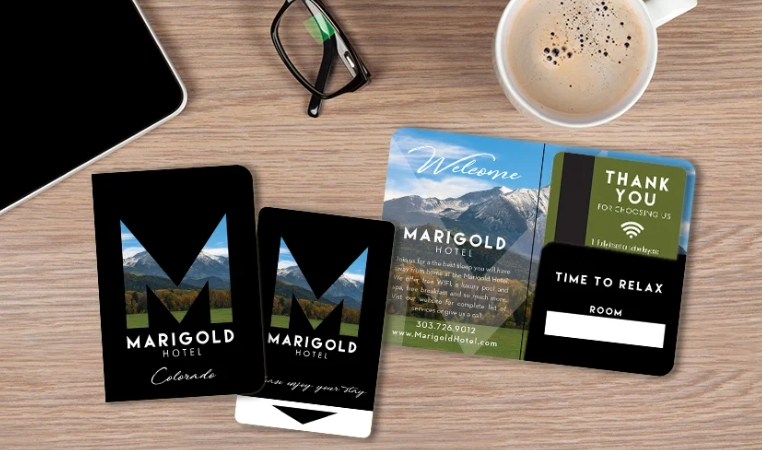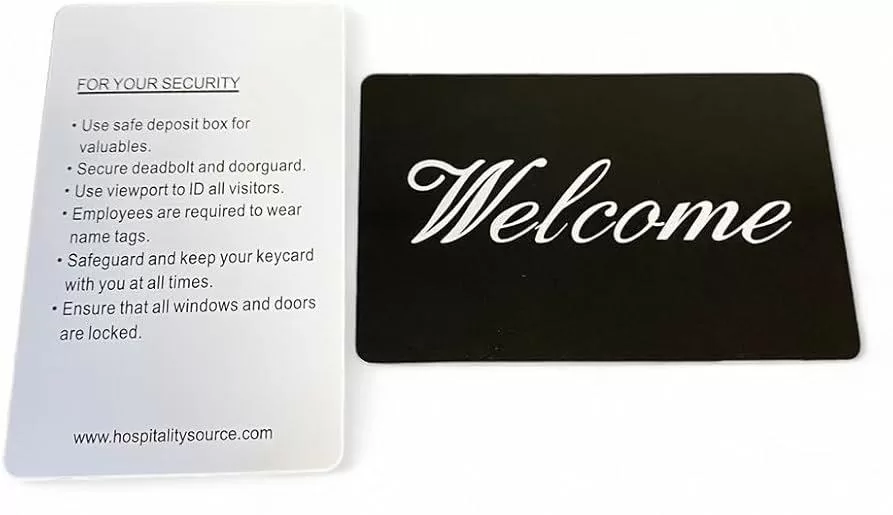
Which type of card is more suitable for Hotel Key Cards?
When guests check-in, besides a warm welcome, the first thing they usually receive is their Hotel Key Cards. But not all room cards are created equal — they differ not only in appearance but also in technology. Some hotels use RFID cards, while others rely on contactless cards. Selecting the right room card can expedite check-in, minimize errors, and enhance the overall guest experience.
Magnetic stripe cards are the traditional choice
Magstripe cards were once the go-to choice for Hotel Key Cards. They’re inexpensive, easy to encode, and widely compatible with legacy locking systems. Typically made from PVC, they store data magnetically on a brown or black stripe. However, their simplicity also introduces risks.
These cards are prone to demagnetization. A guest’s phone or even a wallet magnet can wipe the stored data. Moreover, skimming and cloning pose serious security threats. For budget hotels with limited infrastructure, magnetic stripe cards may still be a viable option. But for high-traffic or high-end establishments, they’re often a liability.

Contact smart cards are secure but impractical
Contact Cards, often used in financial applications, feature an embedded microchip. Guests insert them into a reader, much like a credit card. In theory, this provides better data security than magnetic stripe options. In practice, though, they’re less practical for hospitality.
Contact points wear out over time, leading to physical damage and read errors. Wet or dusty environments, typical in beachfront or resort hotels, can accelerate wear and tear. Plus, guests may find insertion-based access cumbersome. While secure, Contact Cards are better suited for environments where durability and ease of use are less critical.
RFID card is the best choice for modern hotels
Radio Frequency Identification (RFID) Cards dominate the hospitality space today, for good reason. These cards enable contactless entry, allowing guests to wave or tap their cards near a door reader. No swiping. No inserting. Just smooth, efficient access.
RFID cards also boast high durability. Since there is no physical contact with a reader, wear and tear are minimal. Their encrypted communication makes cloning more difficult, significantly enhancing security. Best of all, RFID solutions scale easily and integrate with loyalty programs, payment systems, and even room climate controls. That’s next-level guest personalization.

Comparing Durability and Lifespan
In the hotel environment, cards go through rough use. Guests toss them in bags, expose them to water, or even drop them on concrete. Magstripe cards often fail under such treatment. Contact Cards handle it better but degrade with repeated insertions. RFID cards, however, shine under stress.
Because RFID cards are fully sealed, they resist moisture and dust. Their read range—typically 2-5 cm—is ideal for hotel locks. Many RFID hotel cards last for years before needing replacement. This longevity reduces operational costs and ensures a smooth guest experience across numerous check-ins and check-outs.
Should hotels consider cost or value first
At first glance, magstripe cards appear budget-friendly. However, frequent re-issuance and guest complaints can erode savings. Contact Cards are pricier and deliver robust security but come with usability trade-offs. RFID cards carry a higher upfront cost, but their low failure rate and long lifespan offer a better return on investment (ROI).
Hotels should weigh both initial investment and lifecycle value. A 3-star hotel focused on quick turnover may benefit from magnetic stripe technology for its short-stay guests. However, resorts or business hotels with brand reputations to uphold would find RFID worth every cent. Your guests remember smooth experiences—frustration-free entry should be part of that memory.

Integration with Modern Systems
RFID cards don’t just unlock doors—they unlock possibilities. Many modern hotels link these cards with PMS (Property Management Systems), elevators, gyms, and even vending machines. Contact Cards and magstripe lack this versatility. RFID opens the door to guest analytics and personalized services.
For example, integrating RFID with a guest’s mobile app can allow digital room access, in-room controls, or loyalty rewards activation. The more integrated the system, the more seamless the stay will be. In a market where reviews drive bookings, investing in a better card means investing in better ratings.
Making the Right Choice for Hotel Key Cards
The best type of card for a Hotel Key Card depends on the hotel’s priorities. For those seeking a cheap, basic solution, magstripe works. If top-tier security is paramount, contactless smart cards may be a suitable option. However, for the majority of modern hotels that aim to balance cost, durability, guest convenience, and system integration, RFID cards emerge as the clear winner.


